Natural Capital
- Home
- Integrated Reports
- Natural Capital
Our Natural Capital reflects our commitment to become Climate Positive and leave a Greener Planet for Future Generations. At Dabur, we strive to consistently improve environmental performance of our manufacturing operations, products and supply chain. Our responsibility includes managing our environmental footprint to create a positive impact on the environment and support a lowcarbon economy.
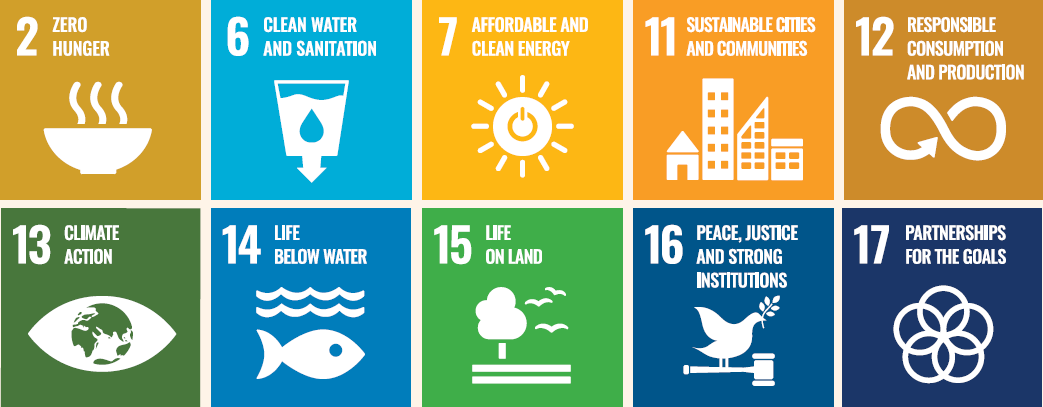
At Dabur, we understand that Climate Action is no longer an option, but a time-bound imperative. Dabur’s vision for the environment is to have no negative impact of operations on the planet. Our strategic priorities include being Net Zero by 2045 and to become water positive by 2030.
Our approach to managing our Natural Capital is underpinned by our strategies on low-carbon transition, reducing dependence on freshwater consumption, pollution control, maximising value from waste, exploring opportunities in the circular economy, and enhancing biodiversity across the value chain.
We have been consistently urging our stakeholders towards behavioural change through consultation and partnership.
We have put in places policies, systems and processes to achieve this as we embark on our sustainability journey towards a greener future. Our strategy is to adopt a low-carbon pathway for all our businesses and translate our sustainability initiatives into lasting outcomes.
We are today focusing on energy use optimization and emission reduction initiatives, incorporating circular economy concepts into plastic waste management, efficient material use, responsible sourcing of raw materials, biodiversity management, water stewardship and finding positive synergies among these material topics. We have devised a mediumterm Zero Discharge strategy with the target of having one Zero Liquid Discharge manufacturing facility by 2026. The long-term target is transforming all plants to Zero Liquid Discharge facilities by 2030.
While overall, our GHG emissions will increase due to an increase in business activity, the intensity is expected to reduce year on year, primarily due to various energy efficiency measures and greater use of renewables. The overall performance is monitored and reviewed by the Board on a quarterly basis.

Dabur has always been at the forefront of conserving energy in its operations with the objective of optimizing consumption of non-renewable fossil fuels, improving energy productivity, mitigating the impact of Climate Change, and reducing operational costs. Efficient energy management and conservation is, in fact, the foundation of its strategy towards managing its environmental footprint.
This year, Dabur adopted a holistic approach of focusing on full Scope 1 & 2 Energy Consumption and has, accordingly, started monitoring Electricity and Fuel data of Non-Manufacturing locations as well, which includes our Offices, Warehouses, Nurseries and Employee Dormitories. This approach has helped us identify key opportunities across our value chain and improve our sustainability performance.
For the past several years, ensuring less energy in operations has been a focus area for Dabur and we have been working towards enhancing both “Energy Efficiency” and use of “Green Energy” within our operations.
We use biomass as a sustainable raw material for energy-generating systems like boilers. This allows us to reduce our dependence on non-renewable sources of energy and minimize our carbon footprint. We are also committed to using less polluting fuels in our energy-generating systems, such as boilers and power gensets. By using cleaner fuels, we are able to reduce our emissions and contribute to a healthier environment. Furthermore, we are harnessing solar energy for generating electrical power. This not only helps us reduce our carbon footprint but also provides a reliable and sustainable source of energy.
In addition, we use energy-efficient technologies in our electrical systems to reduce our overall energy consumption. Finally, we have implemented an effective energy management system through minimization and reuse. This allows us to reduce our overall energy consumption and minimize our environmental impact while continuing to deliver highquality products to our customers.
While overall, our GHG emissions will increase due to an increase in business activity, the intensity is expected to reduce year on year, primarily due to various energy efficiency measures and greater use of renewables. The overall performance is monitored and reviewed by the Board on a quarterly basis.
Dabur has been continuously implementing energy saving measures to improve its energy efficiency. In the last couple of years, Dabur has invested heavily in expanding our Juices portfolio, which is reflected in our business saliency moving towards Foods & Beverages. Manufacturing of beverages is energy and water intensive. Despite this, we have improved our energy intensity by 14% at India level in the past 3 years. In FY 2022-23 alone, Dabur saved ~ 58,169 GJ of energy and improved energy intensity by ~ 12%.
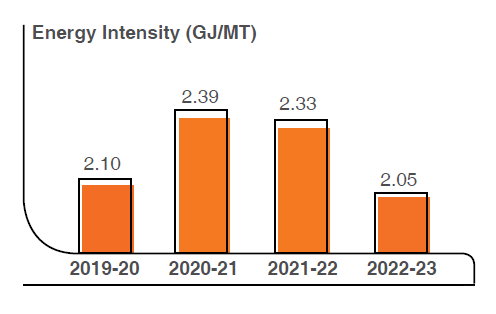
Some of the key initiatives taken this year are:
| S. No. | Steps taken on energy efficiency | Capital Investment (in Lakhs) |
| 1. | Use of energy efficient motors & devices | 383 |
| 2. | Efficiency Improvement on high energy equipment, VFDs, etc. | 196 |
| 3. | Condensate Recovery System using IIoT and AI | 129 |
| 4. | Lighting Load Optimization - LEDs, motion sensors and light pipes | 103 |
| 5. | Line integration, process optimization and interlocking of equipment | 63 |
| Total | 874 | |
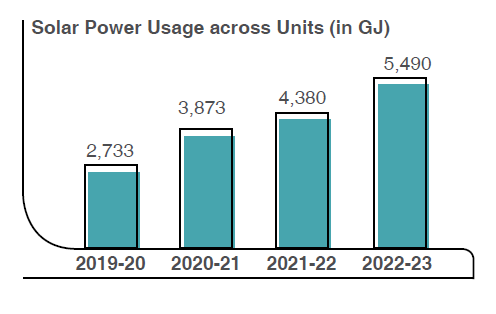
We are relentlessly focusing on ensuring use of green energy within our operations to limit the environmental impact of our scope-1 and 2 emissions. In FY 2022- 23, 50% of Dabur’s total energy consumption (scope 1 & 2) came from renewable sources.
Some of the key initiatives taken this year are:
| S. No. | Steps taken on energy sustainability | Capital Investment (in Lakhs) |
| 1. | Solar power plant – 1050 KW | Opex Model |
| 1. | Bio Briquette boiler | 650 |
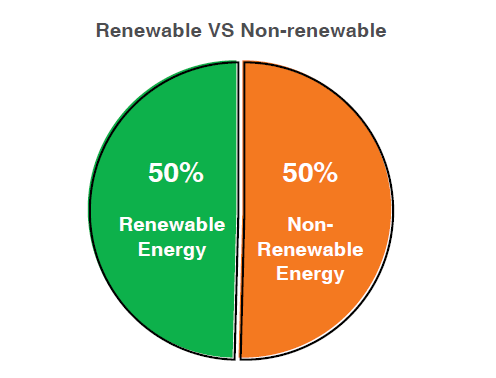
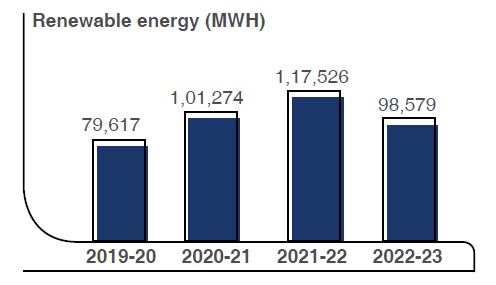
We believe in a holistic approach to manage our emissions footprint. We are investing in emission reduction projects and initiatives, focusing on both our operations as well as supporting low-emission projects in our value chain to address Scope 3 emissions.


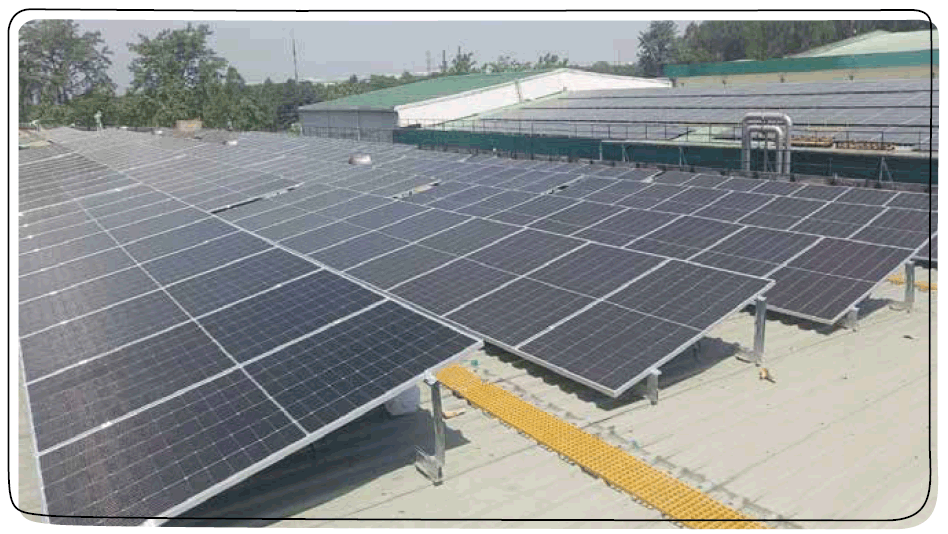
We have achieved 19% reduction in Scope-1 emission values with the same boundary. However, due to the inclusion of our new Indore greenfield unit, this value drops to 10% as against the set target of 7% reduction.
Our Scope-2 emissions increased due to execution of various capacity expansion projects at manufacturing facilities and inclusion of dormitories in the scope. That said, we have achieved 15% increase in consumption of Solar Energy over the previous year. Also, 50% of Scope-2 energy will be generated through sustainable sources by 2026.
Going forward, we intend to calculate and report our Scope-3 emissions, starting 2023-24. We will also prepare a structured plan to reduce our Scope-3 emissions.
Globally, water is a scarce resource. Dabur is committed to implementing Water conservation measures at Manufacturing locations and across the value chain. In FY 2022-23 onwards, Dabur adopted a holistic approach of focusing on full scope 1 & 2 water Consumption and has accordingly started monitoring Water data of Non-Manufacturing locations as well, which includes Offices, Warehouses, Nurseries and Employee Dormitories. This approach has helped us identify opportunities across our value chain and improve our sustainability performance.
Dabur has reduced its Water Intensity by 17% since FY 2020-21. In FY 2022-23 alone, we have reduced our water intensity by ~7%.
We have created a capacity to recharge 7,70,235 KL of water within our manufacturing units. We have not only reduced water consumption within our operations, but are working actively with communities to become Water Positive by 2030.
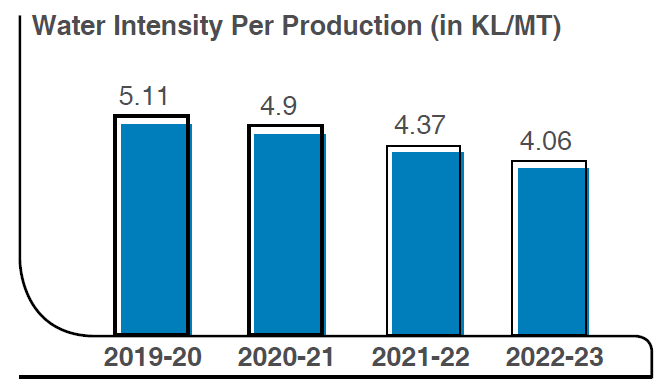
| UoM | 2018-19 | 2019-20 | 2020-21 | 2021-22 | 2022-23 | |
| Water Withdrawn | KL | 13,56,867 | 13,84,117 | 14,17,114 | 14,27,328 | 13,95,971 |
| Water Recharged in community | KL | 6,983 | 6,983 | 8,498 | 9,148 | 45,800 |
| % Offset | 0.5% | 0.5% | 0.6% | 0.6% | 3.3% |
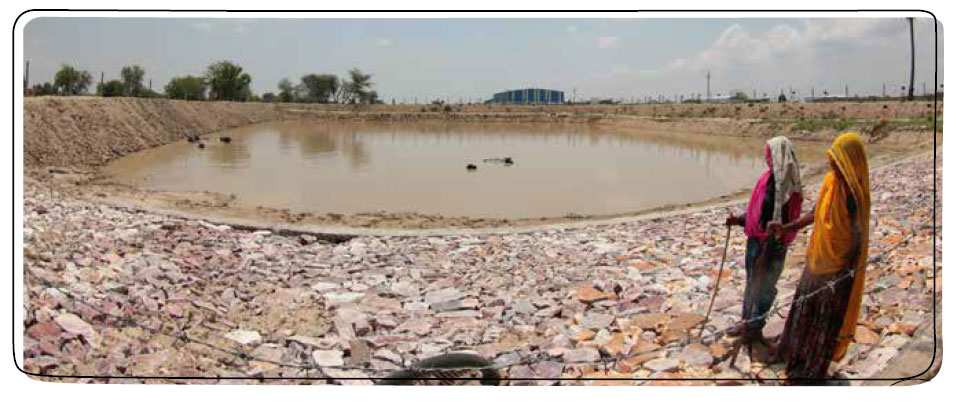
In Dabur, we consider our suppliers as our partners and our relationship with them are guided by the four foundation pillars of ESG: Good For society, Good for Environment, Good for Consumers and Good to Abide by The Law. All these are reflected in our Supplier Code of Conduct (SCOC), which can accessed at: www.dabur.com/sites/default/files/2023-05/ Board-Approved-SCOC.pdf
Good for Society: Dabur encourages its vendor to respect and uphold Labour, Human Rights and Ethical Conduct. Dabur India Ltd has a comprehensive supplier assessment process in place and collaborates with suppliers to conduct desk/on-site assessments through an independent accredited auditing body (3rd party assessment). These assessments adhere to recognized industry standards methodologies. 15% of value chain partners, based on procurement spend, were assessed for Health & Safety Practices, Working Conditions, Sexual Harassment, Discrimination at Work place, Child Labour, Forced Labour, Wages, Freedom of Association and Collective Bargaining, etc, through a third party SEDEX.
All suppliers must adhere to the highest level of integrity in terms of business ethics, covering aspects like anti-bribery & corruption, conflict of interest and anti-competitiveness. Through various standards and certifications like IS017033, ISO27001, vendors are encouraged to improve and manage resources more effectively. For FY 2023-24, vendors doing a business of more than 10 Crore with Dabur India Ltd will be screened and audited through second/third party on matters related to Human Rights and Ethical Conduct.
Good For Environment: Dabur operates on the 3R principle of Reducing waste, Reusing and Recycling resources and products. Dabur has set ambitious ESG goals pertaining to increased Afforestation (Biodiversity), Zero Deforestation and Waste Management (Recycle). By FY 2024-25, we have targeted to achieve 100% afforestation in critically endangered herbs like Kuth, Gugglu Raw, Jatamansi and Aconite Raw Root.
At Dabur, environmental performance is a prerequisite, whereby vendors are required to meet the environmental specifications and/or submit requisite certifications (like ISO 14001, FSC, Rainforest Alliance etc) for allocation or contract award. For instance, we procure beverage laminates only from FSC-certified suppliers. We also encourage and promote increased usage of recycled or re-used input material in CBB Boxes, Mono-cartons, Glass etc.
We have conducted internal assessment of environmental impact due to deforestation risk, particularly in cases where we use paper as a form of packaging. Basis our internal assessment, we have designed mitigation programmes like sourcing from FSC-certified suppliers, avoiding virgin papers in Corrugated Boards and Boxes (CBB) and using recycled paper. Today, 12% of our value chain partners (by value of business done with such partners) contribute to positive environmental impact in terms of using recycled & FSC sourced material. Tetra Pak, for instance, is 100% FSC sourced for FY 2021-22 and FY 2022-23. In Packing material, for Category Carton (Including CBB), mitigation measure has resulted in 86% material being recycled content in FY 2022-23. Directions and leaflets are 100% FSC sourced.
The Executive Management (MANCOM) of Dabur diligently monitors and reviews the ESG (Environmental, Social, and Governance) agenda for sourcing on a quarterly basis.
Good for Consumers: All suppliers of Dabur are encouraged to ensure Food Safety and quality of the material/product. Vendors share Quality Management System certificates like ISO9001:2015, BRCGS, ISO22000, FSSC22000, AGMARK etc. ensuring the hygiene and delivery of quality products to consumers. Top significant vendors with a turnover more than 10 Crores by value across raw material and packing material shall be targeted to ensure that quality management systems are in place and requisite certificates are shared.
We are under the process of developing supplier development modules/training workshops on quality, human rights, ethical trade practices etc. Dabur conducted technical capacity building programmes on Honey and Herbs to increase the efficiency and improve quality aspects and safety management. 8.4% of the suppliers in the crucial areas of herbs and honey were trained for technical aspects and efficiency increase, which is 340 bps higher than the target set for FY 2022-23.
Good to Abide by Law: Dabur expects its suppliers to comply with the law of the land and meet all statutory requirements for business practices in true letter and spirit. About 15% of our value chain partners (by value of business done with such partners) and 40 in count were assessed by SEDEX (Third Party Audit). This marks an achievement of 2.7 times the target set for FY 2022-23. Going ahead, top suppliers by business value of more than 10 Crore will be screened and assessed by a second/third party auditor in FY 2023-24.
For FY 2022-23, Dabur has performed higher by 500 basis points against a target of 10% for the supplier’s assessment and development. Similarly, our significant suppliers assessed were 40 bps higher.
Dabur implements a comprehensive supplier screening process using a set of frameworks that assign weightage to various criteria. These criteria include volume, supplier base, endangered species, seasonality, region specificity (domestic and import), critical components, specialized products, technicality, and substitution. These aspects primarily focus on business relevance and environmental considerations, addressing commodity-specific and country-specific risks. Based on these evaluations, Tier 1 critical/ significant suppliers are identified. For the fiscal year 2022-23, a total of 91 Tier 1 critical / significant suppliers have been identified across 22 materials, contributing to approximately 5.1% of the total procurement spend. Our objective for the FY 2023-24 is to reduce the list of critical materials by approximately 10% by expanding the number of vendors, as seen with Garic Powder and Litchi, reducing usage as demonstrated with Pink Guava and transitioning to other variants, and implementing biodiversity afforestation to minimize the risks associated with endangered herb species, among other measures.
Dabur values the association with MSME vendors and ensures procurement from the vicinity of its production units. For FY 2022-23, 39% of material were directly sourced from MSME vendors; 25% of the material were sourced from within the district and neighbouring districts; 6.74% of the material was procured from Vulnerable/Marginalised Groups/Individuals as part of the policy of preferential procurement.
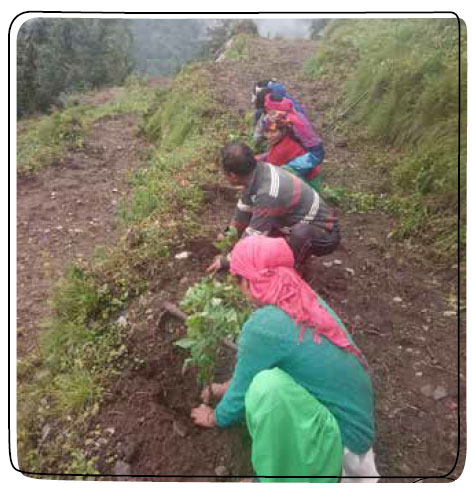
At Dabur, we understand that conserving biodiversity is in the long-term interest of our business and the society at large. Conservation of biological diversity and sustainable use of its components are of paramount importance for our organization. To this end, we have put in place a Biodiversity Policy that demonstrates our consideration of Biodiversity Protection as an integral part of our business and is aligned with the major goals of Convention on Biological Diversity (CBD 1992).
We do not perform any business activity which has an irreversible or negative impact on biodiversity. Also, we do not have any operational sites near nationally important or high biodiversity value area or protected area. We also conduct periodic risk assessment of all raw material/packaging material sources and take appropriate sustainable sourcing procedures/mitigation actions as defined in sustainable sourcing policy.
We have identified risk regarding sourcing of critically endangered herbs and have already started working for its conservation through cultivation and sustainable management. We are committed to source 100% of our critically endangered herbs through sustainable contract farming or equivalent afforestation of these species caused due to our use by 2026. We are committed to work towards no net loss by 2050.
We have been proactively working to preserve ecosystems, halt the accelerated loss of biodiversity and conservation of rare, endangered and threatened species through our Biodiversity Management Plans to enhance their population in natural habitat with the help of relevant stakeholders and local communities. We have also established a fully automated state-ofthe- art greenhouses in Pantnagar (Uttarakhand) and Banepa (Nepal), in addition to satellite nurseries and several demo cultivation sites across the country.
These greenhouses are dedicated exclusively for growing and nurturing medicinal plant saplings. The facility supplies elite planting material to farmers across the country, free of cost. This process enables farmers to cultivate and supply well-standardized medicinal plants on a large scale. During the year, we distributed 32,47,309 saplings of medicinal plants and herbs to farmers across the country for cultivation.These also help protect rare endangered and threatened medicinal herb species from extinction. We partner with farmers, tribals and forest-based communities to establish sustainable cultivation practices and provide opportunities for their socioeconomic development.
We have also engaged with several local NGOs across the country, who are indirectly restoring the loss of biodiversity. These include:
In the year 2022-23, Dabur had engaged 9,653 farmers in cultivation and collection of medicinal plants are herbs, and brought 7,731.48 acres of land under cultivation of medicinal plants and herbs. This marks a 27% growth from 6,096 acres a year earlier.
Dabur strives to reduce the amount of paper consumed in its operations. We have put in place initiatives to save paper, which in turn leads to saving the trees from cutting. We have been working continually to use less paper, in part by adopting technology. We have been promoting paperless meetings, digitizing the way we operate on a daily basis to reduce paper consumption, and using QR codes for goods invoices. We have also undertaken training and awareness programmes to minimize the use of printing the paper and to use both sides of the paper to print if the need arises.
In terms of packaging, we have executed 18 projects in 2022-23 across all verticals with respect to product packaging design changes, weight reduction and transition to sustainable packaging materials. Along with paper, we also track the consumption of Plastics (Rigid), Laminates and Glass used for packaging purposes. Due to these innovative projects, the cumulative potential reduction in the consumption of the mentioned packaging materials has been 369.71 MT. Details of these initiatives are presented in the Intellectual Capital section of this report.
At Dabur, we understand the importance of sustainable practices in our operations. To this end, we have implemented various measures to reduce our environmental impact. One of these measures is an effective waste management system that focuses on waste avoidance, minimization, and reuse. By avoiding and minimizing waste, we are able to reduce the amount of waste that ends up in landfills, and by reusing materials, we are able to conserve resources and reduce our overall environmental impact.
We prioritize water stewardship through the recycling of water and its effective utilization. By recycling water, we are able to reduce our water consumption and minimize our impact on the local water supply. Dabur is committed to implementing 3R (Reduce, Reuse and Recycle) principle for conservation of water. Our manufacturing units are continuously putting efforts to reduce the raw water extraction and to increase the utilization of recycled water into processes. Details on recycling of water are in the next sub-section.
To understand the effectiveness of our efforts for water conservation, we are going through external water audit processes by FICCI and CII every year. Some of the key initiatives which were taken in the areas of water conservation and management during FY 2022-23 include:
In this journey, Dabur Newai Unit received an excellence award in category “Best practices in Water management & conservation category” in CII International Conference on Environment management in CII 3R Awards 2022.
We all are aware about the negative impact of plastic waste on Environment and people’s Health. This have indicated and triggered action from packaged consumer goods companies. Dabur has taken these alarming worldwide condition and warnings very seriously and responded with a nationwide model for Extended Producer Responsibility (EPR).
Dabur's EPR journey started in 2016 by appointing NEPRA and Ahmedabad based waste management company for a waste management study of all Dabur units for obtaining authentic data for EPR liability of all the packaging categories by qualitative and quantitative analysis.
Dabur India is implementing its EPR since 2018 where we are using EPR model by engaging Urban Local Bodies (ULBs) through Waste management Agencies (WMAs) to do so.
In FY 2022-23, Dabur has become a Plastic Waste Positive Enterprise by recycling and coprocessing 35000 MT of post-consumer plastic waste across the country. This covers both recyclables (like PET, HDPE, Beverage cartons) and non-recyclables (multilayered plastic). The year saw Dabur being awarded the excellence award in the category of “Best practices in managing plastic & packaging waste under EPR as PIBO” at the CII International Conference on Waste to Worth in CII 3R Awards 2022. Dabur was also represented in various events by Government of India, Pollution control boards, FAME, CII, FICCI & others on Plastic neutrality, waste management and EPR amendments.
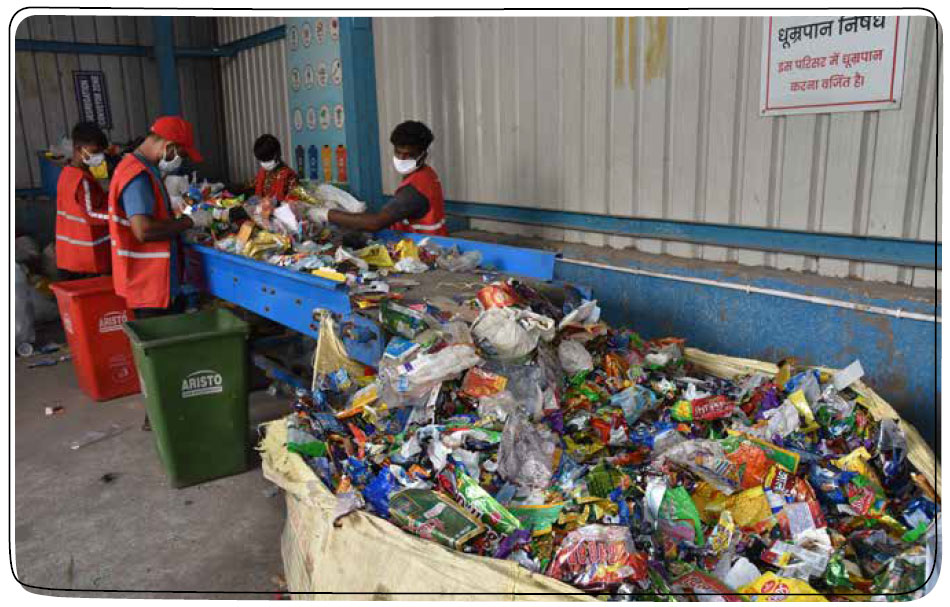
Dabur has taken various initiatives and campaign for plastic waste management and awareness in society with stakeholders such as:
My 10 Kg Plastic Campaign: Our flagship campaign that focuses on bringing the community together in cleaning our cities from plastic pollution. More than 150 housing societies in Delhi-NCR are today associated with this project, which has been creating pollution warriors within the community, educating them about segregation of plastic waste at the source and thereby bringing about a behavioural change among the citizens. Over 300,000 individuals, with women leading the show, are today associated with this initiative. Under this project, we invite individual households to collect and send 10 Kg of plastic waste generated in their homes to become Plastic Waste Neutral Citizens. As per Central Pollution Control Board (CPCB), the per capita waste generation in India today stands at 10 kg and through this programme, we are urging citizens to collect 10 kg waste and send it for recycling through our collection agents and become Plastic Waste Neutral Citizens. The Plastic Waste neutral Citizens of India are also felicitated for their efforts. We have collected 41,329 Kg plastic waste from households in Delhi-NCR alone under the My 10 Kg Plastic project in 2022-23 alone, taking the total plastic waste collected till date to around 90,000 kg. In April, this campaign was extended to Manipur in collaboration with Worker’s Union Manipur. An awareness workshop was organized for the school students at Kongpal Khaidem Leikai, Imphal East, Manipur. Nukkad Natak and drawing competitions were also organized in Chandigarh to build awareness within the community.
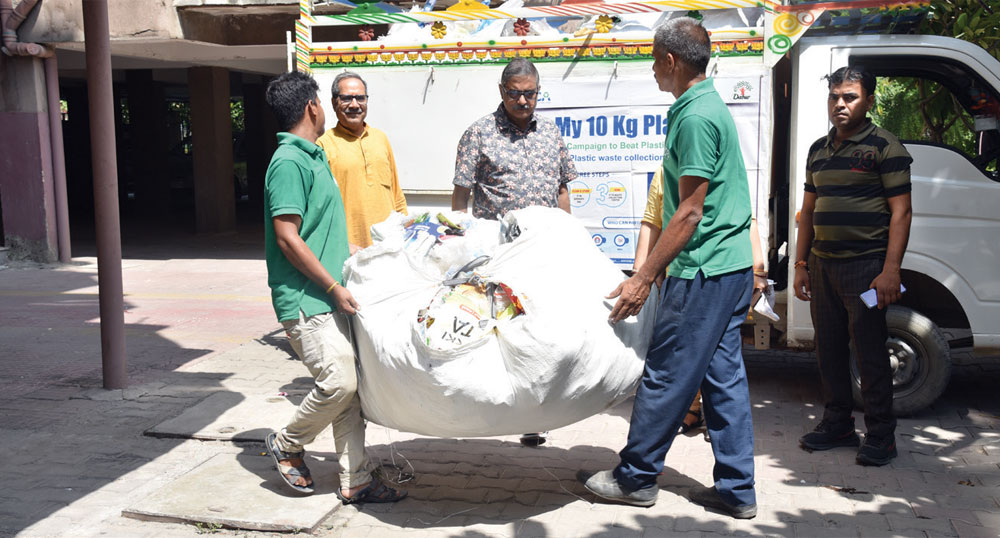
Safai Saathi training program
These were the awareness program which were conducted majorly in Northeast and West India. Personal protective equipment was distributed among waste pickers and vaccination program conducted for waste handlers.
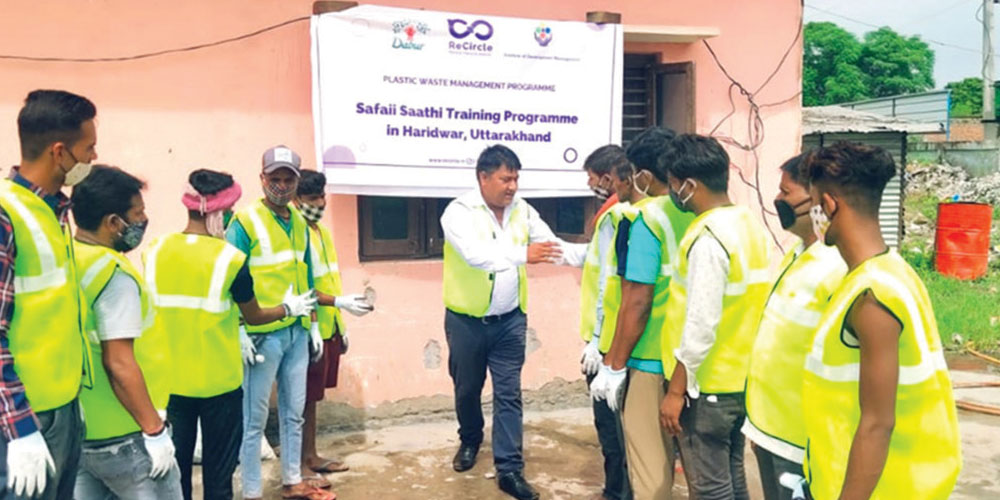
Clean-Up Drives
On the occasion of International Coastal Cleanup Day, Dabur India Limited joined hands with ReCircle to organise a clean-up drive at Bandra Carter road with over 250 volunteers participating and helping spread awareness on importance of mangrove and to promote recycling of plastic waste. Around 75 bags of waste were collected during this drive. The drive also sought to build public awareness regarding prevention of marine pollution and adoption of sustainable lifestyle for healthy oceans. Programmes were also organised to raise awareness about the harmful effects of pollution on our beaches and oceans and to promote a sense of community responsibility.
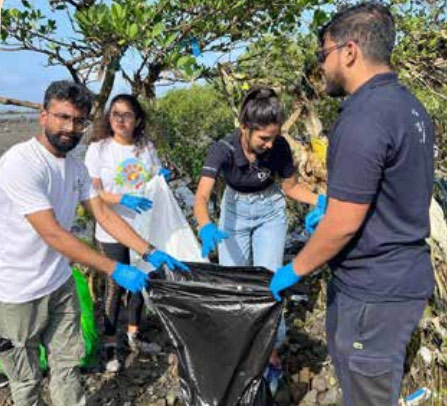

We, at Dabur, focus on both process and product sustainability. Hence, we not only strive to make our manufacturing process lean and green, but also our products. In alignment to this, we have decided to undertake Life Cycle Assessment (LCA) cradleto- grave study to assess the environmental impacts of some of our key products. The outcomes and recommendations of the exercise will be incorporated throughout the product lifecycle to improve product performance, cost savings and reduce the environmental footprint of these products.